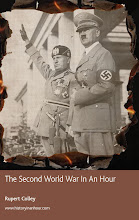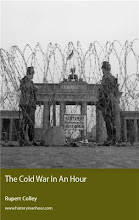For Christmas I was given a copy of Hitler's Mein Kampf (My Struggle) by my 25-year-old nephew who, as I opened it, said, "It's the sort of thing you're into, isn't it, Uncle Rupert?" For a moment I thought he was implying I was some sort of fascist.
The paperback edition that was so neatly wrapped up in Father Christmas wrapping paper was a reprint of Ralph Manhein's 1943 translation with a fascinating 50-page introduction by D.C. Watt, which is, by far, the best bit of the whole thing.
To my relief, my nephew added, "World War Two and all that, you're into that, aren't you?" "Yes," I said, "very much so."
He looked pleased; this "evil book" as it's described on the blurb, had been a good choice.
Currently I'm working on the third ebook for the History In An Hour series - the Nazi Germany, so my nephew's present was a timely one. I'm skim-reading it at the moment because it isn't the easiest nor most pleasant of reads and at over 600 pages I have a hundred other things I'd rather be reading (sorry, dear nephew). But still - dedication to the cause, etc.
Today I was reading up about the French occupation of the Ruhr during the Weimar era and noticed the French troops went in today, 87 years ago - the 11th January, 1923. Not the most exciting anniversary and not exactly one imprinted on Europe's consciousness but being a sucker for anniversaries I couldn't resist mentioning it. What exactly were the French doing in the Ruhr? Here, as a first draft, is my resume of that chapter of German history:
"By 1922 the Weimar government, struggling to pay the reparations demanded by the Versailles Treaty, had stopped paying them altogether. Angered by this breaking of the rules, the French and Belgium governments sent troops into the Ruhr, an essential hub of German industry and source of raw materials. When the outraged German workers refused to work for the new occupiers, the French sent in their own workforce.
"The occupation of the Ruhr caused chaos for Germany's economy, triggering a period of high unemployment and hyperinflation. And still the Weimar was unable to meet its Versailles obligations."
I go on to mention the hyperinflation and the lifetime savings wiped out overnight, and the American 'Dawes Plan', the subsequent recovery of the Weimar economy and finally France's withdrawl from the Ruhr in 1925.
Now - back to Mein Kampf.
Rupert Colley.
To read about Nazi Germany, go to historyinanhour.com
Subscribe to:
Post Comments (Atom)






No comments:
Post a Comment